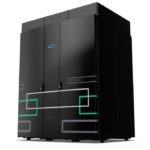The CSC data center in Kajaani, Finland, will host a 30-petabyte data lake for the European Meteorological Satellite Agency EUMETSAT and the Destination Earth initiative. The DestinE data lake will be supplied by cloud solutions company CloudFerro. CSC said the data lake has about 30 rack cabinets, each rack the size of a tall refrigerator. […]
Finnish IT Center CSC (Site of LUMI) and TACC in HPC Collaboration
The CSC – the Finnish IT Center for Science – and the Texas Advanced Computing Center (TACC) at The University of Texas at Austin, have signed a memorandum of understanding to promote research collaboration using high-performance computing (HPC) applications to address global challenges. The organizations said the collaboration focus on joint use of supercomputing resources […]
LUMI: the EuroHPC pre-exascale system of the North
The LUMI pre–exascale supercomputer will be the one of the most powerful and advanced computing systems on the planet at the time of its installation. The vast consortium of countries with an established tradition in scientific computing and strong national computing centers will be a key asset for the successful infrastructure. In this talk we will discuss the LUMI infrastructure and its great value and potential for the research community.”
European HPC ecosystem supports the fight against COVID-19
The European PRACE initiative has released a list of partner activities and initiatives to help combat COVID-19. While medical professionals are working around the clock to help those affected, PRACE partners, HPC centres, and research infrastructures are doing their bit by opening up their facilities for urgent/priority access to the HPC systems and other resources to support the research to combat the coronavirus.
Finnish researchers demonstrate how noise impacts quantum computing
A team of researchers from three Finnish institutions (CSC, Aalto University, and Abo Akademi University) and their collaborators from Boston University in the USA have for the first time demonstrated how the noise impacts a calculation in a systematic way. By varying the time over which the quantum property of the qubits is changed (from microseconds to milliseconds) and studying different numbers of coupled qubits in a D-Wave device, they were able to confirm a general principle of defect creation (meaning errors in the calculation). “According to this principle, a longer computing time should give a better result, but the researchers found that the noise negatively affects the results more if the time is longer. They explained this behavior by a mathematical model, which will be a useful tool for diagnosing future quantum annealing devices and to find the best ways to operate them.”
EuroHPC Sets Stage for Pre-Exascale LUMI Supercomputer at CSC in Finland
Today the European High-Performance Computing Joint Undertaking signed today a Hosting Agreement for one of the three pre-exascale supercomputers at CSC’s datacenter in Kajaani, Finland. “EuroHPC JU is pooling European resources to develop top-of-the-range exascale supercomputers for processing big data, based on competitive European technology with the support of European Union. The first aim of EuroHPC is to purchase three pre-exascale supercomputers for Europe by the year 2021.”
CSC Finland powers AI to help predict hybrid nanoparticle structures
Researchers in Finland have achieved a significant step forward in predicting atomic structures of hybrid nanoparticles. The work was carried out using supercomputing resources at CSC and the Barcelona supercomputing center, as a part of a PRACE project. “This is a significant step forward within the context of new interdisciplinary collaboration in our university. Applying artificial intelligence to challenging topics in nanoscience, such as structural predictions for new nanomaterials, will surely lead to new breakthroughs.”
Mellanox HDR 200G InfiniBand is powering next-gen supercomputers
Today Mellanox announced that HDR 200G InfiniBand is powering the next generation of supercomputers world-wide, enabling higher levels of research and scientific discovery. HDR 200G InfiniBand solutions include the ConnectX-6 adapters, Mellanox Quantum switches, LinkX cables and transceivers and software packages. With its highest data throughput, extremely low latency, and smart In-Network Computing acceleration engines, HDR InfiniBand provides world leading performance and scalability for the most demanding compute and data applications.
Video: LUMI Supercomputer at CSC to run on Sustainable Energy
Today CSC in Finland announced that its datacenter in Kajaani will host a pan-European high-performance supercomputer. The machine will be about ten times more powerful than the most powerful supercomputer currently in Europe. “The investment will make CSC’s datacenter one of the world’s largest players in the field of high-performance computing,” said Kimmo Koski, Managing Director, CSC.
Podcast: What is an Ai Supercomputer?
In this podcast, the Radio Free HPC team asks whether a supercomputer can or cannot be a “AI Supercomputer.” The question came up after HPE announced a new AI system called Jean Zay that will double the capacity of French supercomputing. “So what are the differences between a traditional super and a AI super? According to Dan, it mostly comes down to how many GPUs the system is configured with, while Shahin and Henry think it has something to do with the datasets.”












